

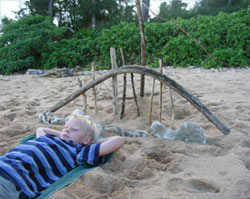 A Personal View of Spirituality's 'Razor's Edge' A Personal View of Spirituality's 'Razor's Edge'
I'm playing with the edge of this sword that "cuts both ways." It's too easily felt, the one edge of radical honesty-it's courage in facing terror and shame. But compassion-so elusive to me because I so well see its substitutes all around, sympathy being an example-is the other edge of the sword. Or perhaps it is, in compassion, that superb 'knowing of souls,' we experience such comfort that we miss the sword actually piercing through to our very heart? Better yet, it has pierced us both?
I can direct my determination. But compassion still sneaks up on me. This truly is to me that double edge of will and surrender. I can only relax, let go, and surrender into compassion. I have to walk right off the edge of the cliff.
And rather than close down my will and compromise my passion in life, I need far more compassion for the amount of will that I carry.
It looks as though there are more steps of faith-to voluntarily enter my own darkness in order to bring it (myself) to light.
 I'm so aware of being unaware, of bumbling around without compassion. Yet there's nothing about this "weakness" that permits me to retreat and pretend that "what is so"-what's discernable-should be forgotten. I can't go back to "flatland." I can't pretend that 'every belief, or every idea, or every feeling, or every response to life' is just as good as another. I can't go back to some distorted ideal of egalitarianism and diversity taken to the extreme, where the path to ecstatic beauty and joy is reduced like as if a ladder laid on the ground so that no one afraid of heights might feel "bad." I'm so aware of being unaware, of bumbling around without compassion. Yet there's nothing about this "weakness" that permits me to retreat and pretend that "what is so"-what's discernable-should be forgotten. I can't go back to "flatland." I can't pretend that 'every belief, or every idea, or every feeling, or every response to life' is just as good as another. I can't go back to some distorted ideal of egalitarianism and diversity taken to the extreme, where the path to ecstatic beauty and joy is reduced like as if a ladder laid on the ground so that no one afraid of heights might feel "bad."
This "weakness" is an admission. It's the humility that was waiting for me all along. It's the humility that, when I put it on, I find to be my true and real skin. It's the real me when I tried to be someone else.
Now, a little better than before, I can insist that the 'ladder' is inclined while also seeing how terrifying it can be. My arrogance is only my lack of admission of where I too am sometimes marooned, clinging to a lower wrung.
It is such freedom, dancing on a razor's edge, knowing I am nothing special while simultaneously knowing that I am bright star light.
 |
| |
 |
Back to top |
Journey Into Aloneness - Part I
 ~ Beginning with Paradox:
When we crave others we become less human ~ ~ Beginning with Paradox:
When we crave others we become less human ~
 (Self Differentiation and Aloneness) (Self Differentiation and Aloneness)
Nearly every human on this planet has a drive for acceptance and approval from others. But few ever realize how they sabotage both themselves and their relationships by this very drive.
 Whether you were to examine the stories found in novels and movies, listen to the testimony of those close to you, recall your own personal experiences, or look throughout written history you will find one manifestation or another of this drive and its consequences. Whether it be a search for the perfect mate, acceptance of one's peers, approval by one's parents and other authority figures, or the seeking of generalized recognition-even fame, people exhaust themselves to be liked or valued by others. Most of humanity are constantly hyper-vigilant, planning, vying, or sitting in quiet desperation for "place and position" in the eyes of others-without ever realizing how to recognize in themselves their unique place and position.
The "relationships" this pursuit produces usually provide us only temporary relief at best. While we as human beings have so much to gain through relationship, most of us cannot relate freely and fully-cannot honestly be ourselves, out of the fear that who we truly are and long to be will jeopardize the very relationships we cling to. Someplace in the back of our minds lies the concern that we could be disapproved of, or we might even be rejected. So we compromise ourselves, and/or our relationships, and wonder why things don't work out better than they do. Most of the human race is entangled in a very vicious cycle. Whether you were to examine the stories found in novels and movies, listen to the testimony of those close to you, recall your own personal experiences, or look throughout written history you will find one manifestation or another of this drive and its consequences. Whether it be a search for the perfect mate, acceptance of one's peers, approval by one's parents and other authority figures, or the seeking of generalized recognition-even fame, people exhaust themselves to be liked or valued by others. Most of humanity are constantly hyper-vigilant, planning, vying, or sitting in quiet desperation for "place and position" in the eyes of others-without ever realizing how to recognize in themselves their unique place and position.
The "relationships" this pursuit produces usually provide us only temporary relief at best. While we as human beings have so much to gain through relationship, most of us cannot relate freely and fully-cannot honestly be ourselves, out of the fear that who we truly are and long to be will jeopardize the very relationships we cling to. Someplace in the back of our minds lies the concern that we could be disapproved of, or we might even be rejected. So we compromise ourselves, and/or our relationships, and wonder why things don't work out better than they do. Most of the human race is entangled in a very vicious cycle.
This addictive pursuit which in some form or another involves most of us, results in "relationships" full of reactive behaviors that keep us from who we want to be. Our unfortunate belief that we so desperately have to be liked or otherwise valued by others leaves us vulnerable to dysfunctional behavior. The "high stakes" of our pursuit leaves us wide open to feelings of betrayal, loneliness, fear of rejection, jealousy, anger, frustration, and anxiety. This is why we experience and/or witness so much animosity, bitterness, deceit, pleading, placating, codependence, and even loss of a sense of self.
What few people realize is that until we each address our own addiction by learning to be alone with ourselves, we will neither improve our emotional wellbeing or the quality of our relationships. Sadly, like junkies (though most of us are quite functional) we avoid doing the seemingly tough work of detoxification, continue to turn tricks for our next fix, and remain trapped in the constant cycle of looking for ourselves in others. Unless each of us enters our own journey into aloneness intimate friendships, dynamic partnerships and marriages, healthy environments with coworkers, and even functional families will, to one extent or another, elude us.
This journey is about breaking that pattern. This journey is about breaking through to the recognition that, in your "aloneness", you are whole, complete, and enough to find personal contentment and to be who you need to be to attract, create, and nurture fulfilling relationships.
"Has it ever occurred to you that you can only love when you are alone?" ~ Anthony De Mello
It takes "an immune system to not only ward off enemies, but also to touch, that is, to love." ~ Murray Bowen
"(When your dependency on people dies you can) enjoy them immensely...they no longer have the power to make you happy or miserable. That's what aloneness means. In this solitude your dependence dies. The capacity to love is born. One no longer sees others as means of satisfying one's addiction." ~ Anthony De Mello (p172, Awareness-The Perils and Opportunities of Reality)
This is the aloneness that each of us must seek to acknowledge in order to be free from being overly dependent, such that we can be alone and yet not lonely. And with each of us recognizing ourselves we are free to fully appreciate and even enjoy ourselves, regardless of circumstance. This has nothing whatsoever to do with "rugged independence". This is about mysteriously acknowledging one's aloneness while in the company of others-even while deeply intimate with another. The end is to be completely free of the illusion of dependency such that we, both you and I, are free to fully value and appreciate the people in our lives.
This journey, whether mine or yours, is about recognition. It is about living within and from one's true self, and knowing one's self in the midst of the many other voices. These "other voices" come in the form of demands, expectations, the pleas of others, and self-imposed belief systems.
While there are many resources for this venture, two individuals particularly stand out for me: one, a psychiatrist, the other, a spiritual leader. Murray Bowen was a pioneer in family therapy, Anthony De Mello was a Jesuit who, while a devout Christian, quoted mystics from all walks of life.
Bowen, working with problematic families, defined fusion, the state where one person is not emotionally distinguishable from another. What he found was that the members of most families with problems didn't need to get closer. They each needed to be better self-defined. To be self-defined is to know one's self, one's values and beliefs distinct from those of others. Aloneness has very much to do with recognizing this distinction between yourself and others.
As I write this I sit back, a little stunned, thinking about how many years I lived where I was so dependent, so fused. Most of my life I believed that my feelings were caused by someone else, often believing that someone was "frightening me" or "offending me". I couldn't clearly distinguish myself from the other people I had contact with in my life. I was fused such that they had to meet my expectations for me to be happy. And lest I be left feeling low and lonely I had to meet theirs.
Bowen's answer to this problem was self differentiation1: one's personal integrity; the capacity to think and act, rather than simply react, from one's own position even in the face of social opposition.
Bowen found his answer as a scientist, studying not only various people across cultures, but also by studying a variety of living organisms. A particular revelation came to him when he learned of an experiment that involved a particular type of single-cell organism that is without an immune system. When two of these single-cell organisms would touch they would fuse into one organism...or, the smaller one would be absorbed or fused into the larger one. What was apparent was that it took an immune system, the ability to distinguish "self" from "non-self", to allow living cells of higher order to not only ward off enemies, but also allowed them to touch each other. When even more evolved cells could "distinguish" themselves they could congregate cooperatively, or even form very complex multi-celled organisms.
Each cell seems to have to get "knowing itself alone" down right before it can both remain itself in the presence of others and be able to be with-or be socialize with-others.
Not surprisingly then, the spiritual leader Anthony De Mello spoke of aloneness as the capacity to be comfortable-even joyous in the freedom-of one's self apart from others. He wrote, "(When your dependency on people dies you can) enjoy them immensely...they no longer have the power to make you happy or miserable. That's what aloneness means. In this solitude your dependence dies. The capacity to love is born. One no longer sees others as means of satisfying one's addiction." And it is from here that De Mello speaks of that capacity allowing one to richly savor life, enter relationships cleanly, become enlightened.
Bowen, from his rigorous viewpoint of scientific theory, and De Mello, from a position of spiritual inquiry, came to a similar conclusion. Both found this-the capacity to be alone-to be what it takes to truly love.
The irony of it all. Here we are with bodies containing billions of cells. Apparently each of our billions of cells possesses enough self differentiation-or "aloneness"-to more or less harmoniously function in extremely complex ways. And yet we each as whole beings are largely in need of the skill of being alone such that we can excel in relationship, both with ourselves as well as with others. |
| |
 |
Back to top |
A Shadow Story
 By sometime in the 1980's I couldn't look at myself in the mirror. I could look at my reflection to shave, but I could not look at myself, eye to eye. It was truly amazing that I awoke enough to even notice. Apparently I'd not looked at myself, eye to eye in the mirror, for some time. Somehow, it had been just fine to never notice, not look, and now, suddenly, I was aware of how I was actually repelled by my own reflected gaze. It was difficult to so much as try to look. I didn't like who was looking back at me. I felt a repulsion, a disgust of my own image-actually my own self. I'm not sure I knew at the time what that great feeling of abyss was at the source of all this. But I know it now; I was bitterly ashamed of myself and the lie I was living.
What I also didn't know, didn't have enough understanding of, was that to the extent that I'd cut myself off from myself, disowned huge chunks of myself, was the extent that this judgmental person I'd become-judgmental of others-was likewise ashamed of my self, my own fullness. By sometime in the 1980's I couldn't look at myself in the mirror. I could look at my reflection to shave, but I could not look at myself, eye to eye. It was truly amazing that I awoke enough to even notice. Apparently I'd not looked at myself, eye to eye in the mirror, for some time. Somehow, it had been just fine to never notice, not look, and now, suddenly, I was aware of how I was actually repelled by my own reflected gaze. It was difficult to so much as try to look. I didn't like who was looking back at me. I felt a repulsion, a disgust of my own image-actually my own self. I'm not sure I knew at the time what that great feeling of abyss was at the source of all this. But I know it now; I was bitterly ashamed of myself and the lie I was living.
What I also didn't know, didn't have enough understanding of, was that to the extent that I'd cut myself off from myself, disowned huge chunks of myself, was the extent that this judgmental person I'd become-judgmental of others-was likewise ashamed of my self, my own fullness.
To the extent that I'd judged others I was judging myself. I'd become an elitist, full of the judgment of others, but in order to 'pull it off', in order to enter a belief that I was 'better than,' I had to cut off those aspects of myself that I judged in others. I mean here that if I judge another as 'wrong and bad' I would, from that same position of judgment, be ashamed to have similar traits, similar weaknesses, similar impulses. So ashamed, I 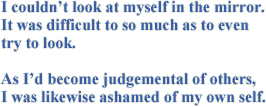 shoved so very much of me into a dark closet that no one, not even I could see. shoved so very much of me into a dark closet that no one, not even I could see.
Of course, whatever you cannot confess and have compassion upon cannot be healed and made whole.
This process of disowning aspects of self was all about "being good," and it is why Carl Jung said he'd rather be whole than good. You see, how I tried to be good was to "try," to effort, and efforting is always a dishonest, unaware, childish activity that feels as though you're accomplishing something when in truth no genuine change actually occurs. Worrying is a good example; it feels like we're doing something about whatever it is we're worrying about, however what we're feeling is just a contraction-our engine is running hot but our wheels are spinning in the mud and we're going nowhere at all but further down into the muck.
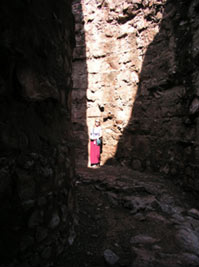  I was caught up in believing I could "think," or "will," or "believe," my way into being good when any authentic integration requires real faith, the faith necessary to completely surrender to the Grace of the Spirit of Holiness.
Now, here I was, in front of the mirror, confronted with years of holding my breath, constricting my chest and I struggled to look directly into my own eyes. And yet this severely uncomfortable recognition of my problem truly was a gift. My growing intensity of shame was the gift of gracious awareness. Although I was experiencing a horror in the mirror, an almost unbearable shame, it was a divine gift of pure grace. This recognition of my incongruence with both life and my self felt nothing like the liberation that it in fact was. I was caught up in believing I could "think," or "will," or "believe," my way into being good when any authentic integration requires real faith, the faith necessary to completely surrender to the Grace of the Spirit of Holiness.
Now, here I was, in front of the mirror, confronted with years of holding my breath, constricting my chest and I struggled to look directly into my own eyes. And yet this severely uncomfortable recognition of my problem truly was a gift. My growing intensity of shame was the gift of gracious awareness. Although I was experiencing a horror in the mirror, an almost unbearable shame, it was a divine gift of pure grace. This recognition of my incongruence with both life and my self felt nothing like the liberation that it in fact was.
And I didn't run from it.although I tried for days thereafter. I was beside myself, uncomfortable with such a level of brutal honesty, a hint of desperation, yet also slightly amused with myself. For as much as I tried to escape this awareness, tried to again hide from myself turning to the right or to my left the awareness "followed" me. It was like blinders in reverse. Whereas blinders are meant to keep horses from being distracted, limiting their peripheral vision, this uncomfortable gift was more like contact lenses that were imposing truth into every view. My defenses had softened and I could no longer escape this reality. Even if I closed my eyes the lenses were there rubbing the backs of my eye lids.
 As I relaxed my defensive contractions the horrific shame melted and passed through me. It took days. Horror slowly turned to relief and defending was eventually replaced with amusement. In the end I rediscovered far more joy and the freedom to love. As I relaxed my defensive contractions the horrific shame melted and passed through me. It took days. Horror slowly turned to relief and defending was eventually replaced with amusement. In the end I rediscovered far more joy and the freedom to love.
Oriah Mountain Dreamer in The Invitation asks whether you like the company you keep when you're alone. Aloneness is a profound, spiritual quality requiring that we no longer run from ourselves, neither desperately depend on finding ourselves reflected in the eyes or responses of others. When we cling to others believing our life depends on community and belonging it feels like we'd die to leave it behind. Yet it is when we are no longer grasping for the acceptance and approval of others that we find our own aloneness. Likewise, it is when we face ourselves in the mirror until we embrace what we see that we become free of the addiction to others, fully freed to love both ourselves and them.
|
| |
 |
Back to top |
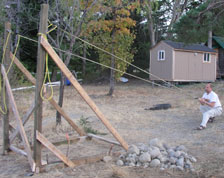 Pain. One Side of a Dialogue. Pain. One Side of a Dialogue.
"What you write above...wow, love you in your place of expansion. Feel it? Maybe not, you're being stretched back, back, back like the elastic in a sling shot...that is what pain is, and the opportunity is to not see it as the world does, as "loyalty" would have us sit with/in the story behind the pain, but to know it for the gift of growth and freedom it is, beyond what we've been taught and had exemplified our whole lives. Then, as it passes through you-because you're not "loyal" to it or to those around you (love is another matter)-then you slip out of the grip of the hand that's pulled you ever so far back and you start to accelerate into the Cosmos!"
"(The way the world relates to pain) reminds me of cards that say, "Get Well Soon." Worldly sympathy, not empathy. Truth be told, what we go through is always an opportunity. "Being with," which is empathy, is far more truthful than sympathy which has as its underlying message, "do everything you can to avoid pain. Life is hell, then you die, and you aren't enough in any way to face life's pain!" That's the story of the damned: the asleep, the blind, those in illusion.
Who wants to wake up? Those few who want to live life in full liberty and expansiveness, that's who!"  |
| |
 |
Back to top |
Gratitude – A Contemplative Meditation
A sure-fire way to expansive fullness and freedom? .Gratitude, radical gratitude. The highest spirituality is always the simplest. It is always both the simplest and the most difficult. Something that is simple is not necessarily easy.
 The Contemplation: Sit (or stand still or lie down) in a relatively quiet place and choose to be thankful for each and everything that comes to mind. Your eyes can be open of closed, whichever you find easiest. When you think of the view out of your window say and feel "thank you." Now continue. When you see (or think of) anything that gets your attention, say "thank you." When think of anyone-perhaps a friend, say within yourself, "thank you." Now continue. Each and every person, place, event, and think that comes to your mind, say, "thank you." The Contemplation: Sit (or stand still or lie down) in a relatively quiet place and choose to be thankful for each and everything that comes to mind. Your eyes can be open of closed, whichever you find easiest. When you think of the view out of your window say and feel "thank you." Now continue. When you see (or think of) anything that gets your attention, say "thank you." When think of anyone-perhaps a friend, say within yourself, "thank you." Now continue. Each and every person, place, event, and think that comes to your mind, say, "thank you."
Easy, isn't it? Well, I hope it is easy for you. However, sooner or later you will think of something you're upset about, or someone who has wronged you. What do you do then? Say, "thank you." "Thank you that I was wronged (assuming, of course, that you're accurate about having been wronged in the first place)?" you ask. Yes, thankful for each and every experience, including problems past, present and future, you give thanks.
"But, this is insanity," you say. "I've been harmed." "There's so much evil in the world."
No, this isn't insane. The world is insane. And the way we perpetuate the insanity by not stepping out of it is insane.
I told you it wasn't easy. I only said it was simple.
There is this Christian scripture-now you don't necessarily have to consider yourself a Christian to gain from this-it says that "all things work to the good to those who love God." Now in that tradition God is the Way, the Truth, the Life, the Light, and so on. So you can substitute any of these and get the point. For example, if you love the Truth all things will work to your good. Or, if you prefer, "If you love Life." I mean to say that if you love it more than anything else, you want to be spiritual and break through into Life itself-then all things work to your good.
The trick is that to love Life, Truth, Light, or God that much requires faith in it. Dynamic spirituality requires radical faith. And the great contemplations, the great meditations are just that: radical acts of faith.
So everything that comes to mind, say "thank you," and something marvelous will happen; you will expand transcendentally and you will transcend expansively.
"Thank you. Thank you. Thank you."
|
| |
 |
Back to top |
 
Life is meant to be fulfilling, both meaningful and joyful;
Life is also inherently challenging, even painful.
Therefore, life requires awareness;
And from awareness: understanding, capacity and skills
such that we may see the beauty and remain in the joy.
When we don't have what we need Life's challenges turn into suffering; we become stuck.
This is the purpose of counseling: to free and empower you to live life fully.
. . . the Psycho-Spiritual Journey
When exploring foreign countries I have found it common to encounter other travelers, and regardless of our diverse countries of origin, I find that what we have in common stands out—our being sojourners in a distant land. But one important factor has become apparent for me. I’ve found that it is those who have done some traveling inward, those who have dared to know themselves and dared to know something of Spirit that get the most out of visiting distant and foreign lands. It amazes me how relatively few people actually cut loose and go abroad, but even fewer venture inward. I have fo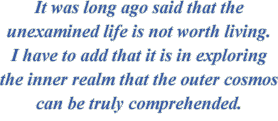 und that in traveling inward there are, similarly, vast distances and horizons, exotic tastes and wonders,hazards andrewards. And it is such an inner journey that frees us to truly see the world around us. Such are the rewards of venturing forth into Living Awareness. und that in traveling inward there are, similarly, vast distances and horizons, exotic tastes and wonders,hazards andrewards. And it is such an inner journey that frees us to truly see the world around us. Such are the rewards of venturing forth into Living Awareness.
Markers, Maps, and Guides:
Geographical explorers have always done their best to consult navigation charts, maps and tools, always valuing the most accurate and comprehensive they could find. Unfortunately, many documents abounded that were vague, incomplete or questionable, sometimes leading to disastrous outcomes.
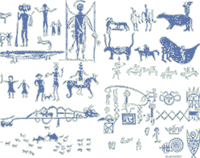 There are uncharted spiritual seas and lands enough as well, so it is wise for spiritual explorers to carefully search for reliable maps. There are uncharted spiritual seas and lands enough as well, so it is wise for spiritual explorers to carefully search for reliable maps.
Furthermore, forms of navigational information vary greatly. They can be the simplest signposts, markers, or compass headings; or they can be elaborate maps with recorded accounts of magnificent detail.
They can be full of metaphoric images of serpents and flying dragons or they can have the precise measurements of science behind them. Each in its way contributes a significant truth.
The realm of venturing inwards is no different. Sadly, most of us, whether stranded on the shore or pinned upon the rocks from pounding surf, have been or still are, tangled and bewildered in a morass of poor charts and navigational aids. These are not healthy and accurate psycho-spiritual tools; they arise from our fears and shame-based conditioning.
We certainly don't want to remain lost or stranded. And we gravely need awareness of expansive and rich destinations so we have something better to move toward. Finally, we need the tools to point us in the right direction and guide us along the way.
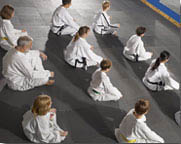 When it comes to the psycho-spiritual, there is an enormous range of "maps" and "markers." Some are as simple as symbols that represent archetypes, meant to remind us of deep truths and focus our attention on them. Some are simple descriptions found in chants, rituals and ceremonies. When it comes to the psycho-spiritual, there is an enormous range of "maps" and "markers." Some are as simple as symbols that represent archetypes, meant to remind us of deep truths and focus our attention on them. Some are simple descriptions found in chants, rituals and ceremonies.
Some are dramas and myths handed down through generations, often in song or story.
Some are systems reflective of the complexity of reality: whether ancient scriptures and religious treatises or more modern philosophies or theories of human health and development. Optimally we can find what's truthful in each of them and create an "integral" navigation system for our journey through the Cosmos, both outer and inner.
Many people make one of two mistakes. They either drift around through life bumbling into things - these are those whom the world's major religions say are living an illusion, asleep or blind. Sadly, they neither seek out maps and navigators nor venture into the inner realms on their own to "rediscover" the beautiful islands, coasts, planets and riches they contain.
This group includes all those who live compromised lives, settling for "getting by" in life, no matter how dull and unrewarding that may be. Often, they defensively ridicule others who have made mistakes or encountered some misfortune in their ventures.
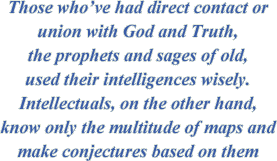 Then there are those who seek out maps, swear by them, but get lost in them. They never get beyond living their lives through the maps and travel books. These are the armchair psycho-spiritual travelers who never leave the comfort of their favorite rituals; the dogmatically-religious (however severe or subtle) and the "theory-bound," hiding within the witty reasoning of their ego. Then there are those who seek out maps, swear by them, but get lost in them. They never get beyond living their lives through the maps and travel books. These are the armchair psycho-spiritual travelers who never leave the comfort of their favorite rituals; the dogmatically-religious (however severe or subtle) and the "theory-bound," hiding within the witty reasoning of their ego.
No, venturing into and through this life fully with your eyes wide open is not for the faint of heart. But the rewards are beyond measure.
And the "treasure maps"-the symbols, proverbs, stories, religious disciplines and theories of humanity-the best of them-are wise and helpful for our journey. We simply need a healthy relationship to them. Some contemporary "navigators" and "mapmakers" such as Anthony DeMello and Eckhart Tolle serve as examples.and their guidance can be wonderfully liberating.
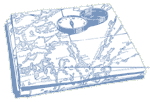
One can get lost in the Cosmos .or worse, one can get lost in a multitude of maps.
Either way, however-no matter how good the "maps," we eventually have to leave them behind and venture into land and sea, sky and space that is new to each of us. Can you imagine sitting in the driver seat of your car, holding a large, unfolded map in front of you-your whole view obscured by the map-and yet you try to drive the car? Yes, it is wise to consult the maps and travel books. But then we have to put them aside, step out and truly live our own lives. Eventually, we have to take some risks and put up with some of the discomforts of travel in order to truly deepen ourselves psychologically and expand ourselves spiritually.
Perhaps the best psycho-spiritual maps indeed show an edge to the world, a place where we either “fall off” or we make a deliberate leap of faith. Because this place is too difficult to sketch it’s often referred to as mystical in nature and, for that matter, those who’ve ventured there have traditionally been called mystics.
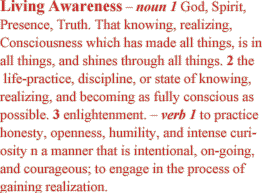
To find images of beasts shrouded in fog on the charts at these nether-lands beyond the "known world" shown in ancient maps is somewhat appropriate for our inner journey. After all, this is where we may encounter the 'dark night of the soul' on our way to the heavenly places. Indeed, the "drop-off" is aptly shown as our usual reliance on our beliefs and emotional responses become wholly inadequate and must be left behind in order to reach these next realms.
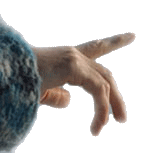 All of this is perhaps best summed up by the adage of the raised hand with an extended finger. Many, unwilling to face the pains and responsibilities of life, suck on the finger finding infantile comfort. Many others, full of shame and condemnation, use the finger to gouge out their eyes-or the eyes of others. Some even pontificate on the gesture and published all their findings. Nearly all make shrines of the form and worship it. And then there are the few who see the finger for what it is, a marker that points beyond itself to the Truth. These are they who appreciate the gift that it is, willingly aligned themselves with it, and leave the marker (teaching) behind as they venture forth and make contact with Living Awareness. All of this is perhaps best summed up by the adage of the raised hand with an extended finger. Many, unwilling to face the pains and responsibilities of life, suck on the finger finding infantile comfort. Many others, full of shame and condemnation, use the finger to gouge out their eyes-or the eyes of others. Some even pontificate on the gesture and published all their findings. Nearly all make shrines of the form and worship it. And then there are the few who see the finger for what it is, a marker that points beyond itself to the Truth. These are they who appreciate the gift that it is, willingly aligned themselves with it, and leave the marker (teaching) behind as they venture forth and make contact with Living Awareness.
Note: As a presence-centered counselor I will set an example, provide pointers and encourage you to venture beyond what is known for your own realization. |
| |
More to come... |
|
All writings by Kurt Treftz (unless otherwise quoted), copyrighted 2006 (or otherwise dated). All rights reserved. These writings may be shared on only a non-commercial basis unless specific permission has been granted otherwise. |
| Back to top |
| |
|

